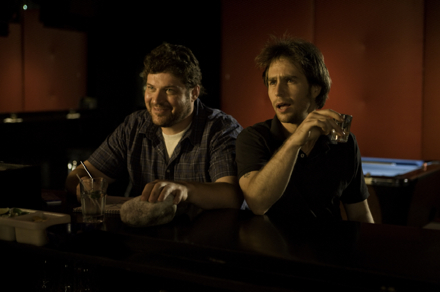CHOKE
(Clark Gregg, 2008)

(Clark Gregg, 2008)

As of writing, Choke has not yet been given official distribution, and will not get it for about another month and a half at least (depending on your location). However, I managed to see it at the annual local film festival. I'll bring this review up when the film gets a wider release, but for now here is my initial opinion.
Choke is the story of sex-addicted loser Victor Mancini (Sam Rockwell). Victor's main concern in life is to keep his demented mother (Anjelica Huston) alive and in hospital. He does this in the hope of finding out the truth about his strangely absent father. To pay the bills, he pretends to choke on his dinner in fancy restaurants and plays off his saviour's heroism for financial gain.
I think the majority of readers here are at the very least aware of the existence of Fight Club, the only other major movie aside from Choke to be based off a Chuck Palahniuk novel. Most of the people who will seek out Choke will do it mainly because of the connection to either Fight Club or the Choke novel (or both, as the case may be). Of course, I'll have to play the comparison game here, but it has to be said - Choke is a very different beast to both its source novel and its spiritual predecessor, Fight Club.
Anyone who's read Palahniuk's writing will know that his books are frequently dark, very twisted and somewhat humourous. Words like "diseased" and "cancerous" come to mind. It's this same feeling that infected both the Fight Club and Choke novels and made them perverse joys to read. Palahniuk's touch even translated perfectly in David Fincher's adaptation. With Clark Gregg's adaptation of Choke, the stylish darkness is traded for a far more conventional "quasi-independent comic" approach. Strangely enough, this seems to suit Choke even better.
After all, Choke is first and foremost a comedy. At a guess, I'd say it's roughly 80 per cent faithful to the original novel (more on that later) with a large number of jokes lifted from the novel. The laugh factor was a strange thing. On one hand, the laughs managed to stay more or less consistent, with none of the jokes falling flat. On the other hand, I personally didn't feel like anything was too funny. Everything raised a genuine chuckle but as for anything approaching "struggling-to-breathe" humour, there wasn't much there. It makes me wonder what's better, a comedy with consistent chuckling or sporadic bursts of hilarious moments. Not too sure.
Regardless, the film manages to be an enjoyable experience. First-timer Gregg manages to handle his duties (which include writing, directing and even one very amusing bit part) with confidence, balancing comedy with drama effectively. The acting is impressive to say the least. Rockwell manages to nail Victor perfectly, yet it's Brad William Henke that manages to steal several scenes as Victor's friend Denny. Another treat is the score, which is an interesting blend of different styles.
Choke not only manages to be an entertaining comedy, it also becomes a very good example of how to streamline a 300-page novel into a movie that's just shy of the 90-minute mark. The only problem with it depends on whether or not your sense of humour agrees with the film's, but if this film was already on your "to-see" list, that shouldn't be too much of a problem.
__________________
Iro's Top 100 Movies v3.0
I really just want you all angry and confused the whole time.
 thanks
thanks 





